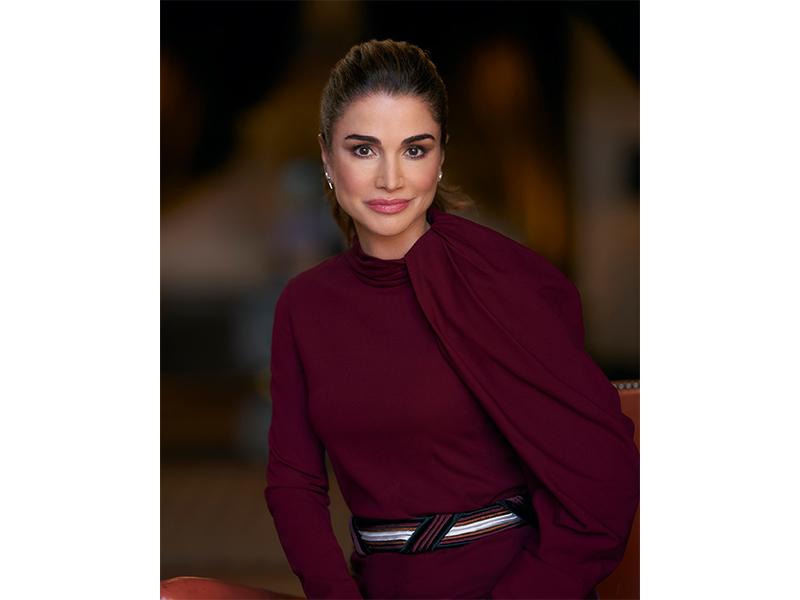She is striking, she is eloquent, and she is the 33-year-old Queen of Jordan, a country which has been trying to bridge the divide between the Arab world and those of us in the West. And recently, her majesty made a trip to New York and had a chance to sit down and talk with us about some of the things she thinks are so important to get done.
With cameras and flashbulbs, the stunning and serious Queen Rania of Jordan opens an exhibit at New York’s Museum of Natural History.
It’s on Petra, the lost City of stone, the ancient city in Jordan which was once a beacon of progress for the world. Today, the queen sees it also as a bridge to Americans in a complicated time.
Just yesterday an American convoy attacked by terrorists in the Gaza Strip. In Iraq, ongoing tensions about how long Americans will stay. And the continuing horror of honor killings, women killed by their fundamentalist families because they defied tradition.
Recently in London, Abdullah Yonas began a life sentence for slitting his own daughter’s throat because she had a relationship with a Christian. And in Canada, a mother may now face extradition for arranging her daughter’s murder because the young woman married a man thought to be beneath her.
Queen Rania is speaking out against honor deaths, a tricky issue in her country bridging past and present, even as she bridges the Arab-American divide, reminding Americans Petra was once a civilization as glorious as ours.
QUEEN RANIA: An exhibit like this, I think, really opens people’s eyes. I think Americans will find it very enchanting and inspiring to see how the ancient Nabataens were able to carve this beautiful, magnificent city out of sandstone, where they saw the potential for splendor and grandeur in a very desolate and very barren landscape. And if anything, it teaches us that there’s always hope at the end of the tunnel; even in the bleakest of situations, you can always find a way out.
As we know, yesterday, an American convoy was attacked, many people wondering if this is the beginning of a new front, and that Americans will now be under attack in the Israeli-Palestinian areas.
QUEEN RANIA: Well Diane, I really hope that this is an isolated incident and this is not in fact the beginning of a new phase. But let me just say that I think over the past couple of years in the absence of any real progress on the peace track, the extremists have been allowed to take center stage and they’ve been able to sort of dominate the scene and express their views. And I think the only way that we can combat that and balance it is by having real progress on the ground, by really making sure that we take steps to move towards a peaceful solution to this conflict. Because in its absence, I think it’s going to represent a danger, not only to the people in our region, but to the entire international community.
Has the American presence in Iraq helped or hurt?
QUEEN RANIA: Well, I think for most Iraqi people, I think that the majority of them are happy to see the old regime go... I think people misunderstand or misread American policies in our region. There’s a lot of suspicion towards where America stands. I know that it is not in America’s interest to be in Iraq longer than it needs to be, but I think that needs to be clearly articulated and communicated to the Iraqi people and the to rest of our region.
On to another topic, which I know is a sensitive one, but honor death continues in this world. And it seems everyone wakes up and says this is not possible still in 2003 that honor death continues.
QUEEN RANIA: You know, it really does baffle me. And Jordan is very, very committed to really finding a solution and ending these crimes against women. And let me say, that this is not just a problem in Jordan or the Arab world. It’s actually international. I was reading in an article in the British press that about 5,000 women are estimated to die as a result of crimes of honor or crimes of passion. So I think we all have a lot of work to do in protecting women from these kinds of atrocities. And in Jordan we have to work from the bottom up. We have to educate people about what these crimes are and how they are very much against Islam. And we need to get the religious leaders to speak to the people and try to educate them about this. I think the more awareness we can build, the more we can hope to achieve in terms of ending these kinds of crimes. As you said, it’s just not acceptable. We don’t have a very large number of crimes in Jordan...but I think one crime is one too many as far as I’m concerned. And the reason why Jordan has been associated with this is because we are really trying to deal with this problem head on and talking about it very openly...
How complicated is it for you to speak out against it, to campaign against it?
QUEEN RANIA: Well, I try not to think of, you know, how complicated. I just think that it’s the right thing to do. And if I don’t do it, then I’m just not fulfilling my obligation towards my people. If I’m not going to protect the rights of women, then why am I here for?
And for you, what’s the next mountain?
QUEEN RANIA: I think, you know, there’s no shortage of mountains in our region, unfortunately. You know, you have a whole chain of mountains. There’s a whole chain of it. And I think in the midst of all this, Jordan is very committed to really being a model of success. At the end of the day, hopefully success is contagious. And if we can have a successful model, then maybe it will be emulated by other countries in our region.
© Copyright, CBS


